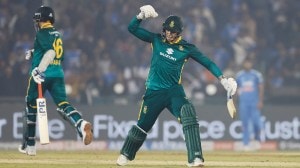The Wail of Kashmir
A memoir of the Valley caught in the crossfire — where surrendered militants dream of discotheques and landmines are strapped on boys

A memoir of the Valley caught in the crossfire — where surrendered militants dream of discotheques and landmines are strapped on boys
Basharat peer’s Curfewed Night is a cry from the heart that needs to be heard and heeded. It is a cry, moreover, on behalf of the people of the Kashmir Valley who have been caught, for nearly two decades, in the crossfire between the Pakistan-backed militants, indigenous as well as foreign, on the one hand, and the security forces that must take on the merchants of death and terror, on the other. Peer is a young Kashmiri Muslim and his narrative is in the form of a memoir of his childhood, his village, his days in school, his family and the people at large for whom life has been hell because of violence, crackdowns and relatively frequent oppression. The main merit of Peer’s lucid and eminently readable work is its restraint and moderation even where he describes events that are grim and gory.
In his early 30s, Peer is a journalist who worked for some years in Delhi and is now based in New York where this book was written. Peer never joined those Kashmiri youth who went across the Line of Control (LoC) for training in Pakistani military camps but he has written vividly about those who did, including many who surrendered and gave up arms and “are now dreaming of discotheques in their villages”. Incidentally, as a schoolboy, he and his classmates did approach a uniformed and armed JKLF “commander” with the request that they wanted to join his ranks. Laughingly, he told them to “go home and grow up, kids”. To keep him away from trouble, Peer’s father, an officer in the state government, sent him to Aligarh Muslim University from where the young man shifted to Delhi. But, apparently, the call of Kashmir was too strong for him to resist. So one morning he gave up his job and went “home in search of the stories and the people that had haunted him”.
A lot of what Peer says about the acts and excesses of the army and paramilitary forces is chilling beyond words. For instance, he writes of the night when the security forces fired on a wedding procession and the “bride was raped” by “rampaging BSF men”. In another horrifying incident, the army is accused of picking up two young boys, and after “strapping landmines on their bodies” sent them to confront “a group of armed militants holed up in a house”. There are also references to various “massacres”. But, to his credit, Peer is never one-sided in his account.
For example, he writes: “In the winter of 1990 Srinagar was the city of protests, the city of massacres. Militants joined the Indian forces in a display of brutality. Mushir-ul-Hasan, the vice-chancellor of the Kashmir University, was kidnapped and killed…. Prominent Kashmiri Pandits and Muslims seen as siding with India were the next targets. On May 21, 1990 militants from Hizbul Mujadeen, the pro-Pakistan militant group, assassinated the head priest of Srinagar, Maulvi Farooq…. Paramilitary forces fired at the slain priest’s funeral procession. Bullets pierced the coffin; pallbearers and mourners fell. A hundred were slain. Their blood-soaked shoes lay on the road after their bodies were carried away. People forgot the head priest’s assassination; anger rose against India.… The firing on the mourners and the image of their blood-soaked shoes found their way into poetry and paintings.”
Peer was a schoolboy when Kashmiri Pandits were hounded out of the Valley to rot till today in refugee camps in Jammu and Delhi. Seeing the empty benches where his Pandit classmates used to sit, he discovered that along with killing hundreds of pro-India Muslims, ranging from activists to suspected informants of Indian Intelligence, the militants had killed hundreds of Pandits “on similar grounds, or without a reason”.
At the time of Maulvi Farooq’s assassination, Peer was 13. On returning to the Valley several years later, he recorded: “I heard and remembered stories of brutality, courage, love, faith, loss or even hope. Both Kashmir and I had changed. The heady, rebellious Kashmir I left as a teenager was now a land of brutalized, exhausted and uncertain people.… The conflict might leave the streets, but it might not leave the soul.”
Army leaders, serving and retired, who, in their interaction with me, have often complained that their officers and men are being maligned even on charges that have been proved to be false would be well-advised to read Peer’s book. For Khushwant Singh is entirely right in describing it as “beautifully written, brutally honest and deeply hurtful”.
- 01
- 02
- 03
- 04
- 05































